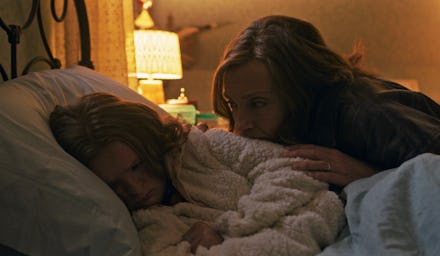‘Hereditary’ is the latest horror movie to redefine the terror of motherhood

Approximately midway through the superlative new horror film Hereditary, Toni Collette’s Annie screams at her son the worst thing that a parent can say to a child. We find out shortly that it’s all in a dream, but the emotional ramifications rapidly playing out in the moment are very real: She clasps her hand to her mouth, instantly ashamed of herself. And yet the sentiment she divulges comes from a place of naked honesty to which many parents may be able to relate. Tilt your head just right and it looks almost like an act of bravery, of baring truth that’s harsh and uncontainable.
Going into the specifics of that scene would dull that jagged dagger of a line’s dramatic power. So, suffice it to say that both Annie and the debut feature from writer-director Ari Aster that contains her — which is out Friday — have a complicated relationship to the notion of family. For Annie, equally dutiful as daughter to an imperious mother and mother to an odd enigma of a daughter, her immediate relations keep her bound to the past while simultaneously casting a pall on her future. She cares for them, or at least she wants to give them the care she knows she ought to, but they seem to be intent on driving her to madness — as those we call our “loved ones” are wont to do.
Hereditary is one of a handful of recent, independently produced, glowingly reviewed horror pictures that hinge on the central metaphor of motherhood and its attendant tribulations. (Between that title and the brutally literal poster art, surely revealing that much doesn’t qualify as a spoiler.) Aster’s new film, Jennifer Kent’s 2014 Aussie import The Babadook and the sleek 2015 Euro-nightmare Goodnight Mommy from Veronika Franz and Severin Fiala form a tidy thematic triptych of modern mom-horror.
Each film revolves around the final taboo in a film culture so desensitized that the narrative blueprint of rape-and-revenge has been reused enough times to form a subgenre all its own. This trio of pictures — to which one may fairly add Lynne Ramsay’s 2011 film We Need to Talk About Kevin after going back a few more years — dares to suggest that some unfortunate mothers wake up one day and realize that they really and truly don’t want their children. For others, the epiphany is that they never wanted children at all. In the kind of polite society that’s coined a term like “mommy blogging,” such a thought is unspeakable, but with the perils of horror providing a safe remove, Hereditary and its ilk can let it out in a gasp.
While hardly the first filmmaker to render the abstract anxieties of parenthood as external terrors, Aster’s leading a generation that thinks of the topic’s particulars a bit differently. The mother-horror that came before has traditionally focused on the visceral element inherent to childbirth, the surrendering of the body to a parasitic force that the mother can neither understand nor control.
Roman Polanski’s 1968 landmark Rosemary’s Baby famously transmuted the pregnancy experience into a Satanic episode, the usual hunger pangs traded for a blood thirst slaked only by eating raw liver. David Cronenberg has made a career of exploiting the grotesquerie of the human body, and between the abdominal distending and the constant nausea, the process of creating new life provided him with a perfect subject in his 1979 shocker The Brood. Both of these films, however, roll the credits before these women are forced to live with their unholy offspring.
The triptych of modern mother-horror mentioned above joins the assorted maternal protagonists when their children are all around the 10-year-old mark, mature enough to be cogent but not so mature that they know when they’re being annoying. Hereditary, The Babadook and Goodnight Mommy seize on a resentment that runs deeper than morning sickness — it’s the existential queasiness of knowing that you’ve been shackled for life to a job you’re not cut out for.
An artist in the medium of meticulously designed miniatures, Annie works too hard to be the attentive caregiver that her husband (Gabriel Byrne) then has to be. In The Babadook, Amelia (Essie Davis) finds that doting on her special-needs 6-year-old does not come quite as naturally as she had hoped, and that his extreme behavior wears on her patience far faster than she’d like. Fiala and Franz use the true phenomenon of the Capgras delusion as a starting point for Goodnight Mommy’s story of mutual distrust between a mother and her twin boys that quickly, shockingly turns violent. In all instances, the viewer can attain some measure of sympathy with the mother captive to her own circumstance.
While the paradigm of compulsory motherhood fades as married couples assert their right to not reproduce, the mentality of compulsory love persists. The true self-sacrifice begins after a woman has nearly torn herself in half passing a living organism from her body into the world, when she must then defer her entire self — her ambitions, her shortcomings, even her hatred — to the defenseless creature dependent on her. The demands of the gig are inconceivable until they are suddenly very real; you can never truly know what to expect when you’re expecting, self-help books be damned.
Adults have children for all manner of reasons, some (a desire to put good into the world and share prosperity with another living thing) better than others (boredom, emptiness, carelessness). The job of parenting is so easily stumbled into and, as demonstrated by these films, the costs only make themselves known once there’s no reneging on that responsibility. For the mothers of Hereditary, Goodnight Mommy and The Babadook, the miracle of life is a life sentence.